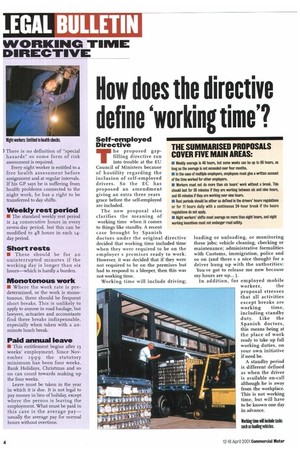How does the directive define 'working time'?
Page 26

If you've noticed an error in this article please click here to report it so we can fix it.
Self-employed Directive
The proposed gapfilling directive ran into trouble at the EU Council of Ministers because of hostility regarding the inclusion of self-employed drivers. So the EC has proposed an amendment giving an extra three years grace before the self-employed are included.
The new proposal also clarifies the meaning of working time when it comes to things like standby. A recent case brought by Spanish doctors under the original directive decided that working time included time when they were required to be on the employer s premises ready to work. However, it was decided that if they were not required to be on the premises but had to respond to a bleeper, then this was not working time.
Working time
will include driving; loading or unloading, or monitoring these jobs; vehicle cleaning, checking or maintenance; administrative formalities with Customs, immigration, police and so on (and there s a nice thought for a driver hung up with the authorities: You ve got to release me now because my hours are up... ).
In addition, for employed mobile
workers, the proposal stresses that all activities except breaks are working time, including standby duty. Like the Spanish doctors, this means being at the place of work ready to take up full working duties, on your own initiative if need be.
A standby period is different defined as when the driver is available on-call although he is away from the workplace. This is not working time, but will have to be known one day in advance.
































































































